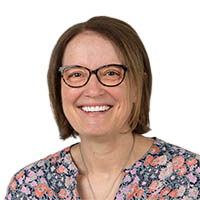Social work’s Chartier to lead behavioral health research institute and its signature survey
As an associate professor of social work and researcher, Karen Chartier, Ph.D., has been a regular user of data from VCU’s Spit for Science, an annual student survey.

Now she will have a chance to lead the university’s signature survey project and its parent organization, the Institute for Research on Behavioral and Emotional Health (IRBEH). Chartier began the role of interim director Jan. 18 of both the Spit for Science project and the institute – elevated last summer to a university-level institute after previously operating as the College of Behavioral & Emotional Health Institute.
Chartier succeeds Danielle Dick, Ph.D., who has been named director of the Rutgers Addiction Research Center after leading the institute for six years. Ananda Amstadter, Ph.D., an associate professor at the Virginia Institute for Psychiatric and Behavioral Genetics, will continue as the institute’s associate director.
“Having collaborated with the institute for many years now and having enjoyed the interdisciplinary relationships with faculty colleagues and students that it promotes, it seemed like a natural fit,” Chartier says.
“The interim title is through this academic year and the end of June, with the opportunity to continue as director. These months are really like, ‘let’s make sure this is a good fit.’ As a university-level institute, directors will likely serve five years, and there is an application process to renew for five more.”
Spit for Science began in fall 2011 as a way to gain an understanding of how genetic and environmental factors contribute to alcohol use and emotional health, using a voluntary and confidential digital survey as well as a DNA sample through saliva. “I’ve been affiliated in some way since I started,” says Chartier, who joined VCU in 2013.
Students are surveyed annually and are tracked as cohorts, and there are a number of related outcomes managed by the institutional arm. “The survey is focused on their emotional health, their substance use and their overall well being,” Chartier says. “We want to see how students are doing as they progress and who may be at a greater risk for those things at what can be a critical point in their development as emerging adults.”
As much as it’s about doing research and generating information, it’s also about how to apply that information once we know it to help other people. … It’s what social work is really all about.
Karen Chartier, Ph.D., interim director of the Institute for Research on Behavioral and Emotional Health and Spit for Science survey
In addition to studying student well being, the registry of survey data – maintained in collaboration with the Office of the Vice President for Research and Innovation and administered by Emily Lilley – is critical for researchers from across disciplines, facilitating evidence-based projects and programming for students.
“We’re bringing together people on both campuses and thinking about the application of that information – how can we address and help those who are more at-risk,” Chartier says. “We’ve had nice collaborations over the years with Rams in Recovery and The Well,” a health promotion and services unit that is now part of VCU Recreation and Well-Being (RecWell).
An additional component is undergraduate research opportunities, including a regular course taught by Amy Adkins, Ph.D., a teaching assistant professor in psychology, and two fellowship programs. VCU Great is a summer research mentoring program focused on substance use, addiction and genetics; a new program this year is expanding those offerings for the full academic year.
“The new program will offer a similar focus in terms of mentorship and coursework,” Chartier says. “We have created a better pipeline for groups and individuals underrepresented in research to move into graduate school and become researchers. The summer program is really excellent; we just needed to strengthen the pipeline and have this be more than just a summer program.”
Chartier sees a natural connection between the institute’s initiatives and social work, as well as benefits for her faculty colleagues and students in the School of Social Work.
“I think the application piece, it’s what social work is really all about,” she says. “As much as it’s about doing research and generating information, it’s also about how to apply that information once we know it to help other people.
“I think even though this does have a university-level focus, the benefits for the School of Social Work are many. My hope is that our faculty doing related research will gain from developing new collaborations. And can we provide social work students field placements through the institute as we think about ways we can apply this to inform programs and services?
“I really see this as having been given the opportunity to shepherd these really exciting, interdisciplinary programs.”
Categories Faculty and staff, Research